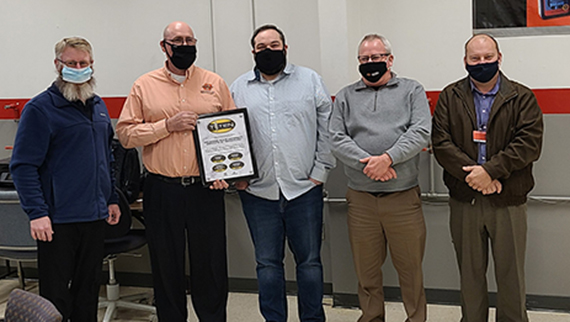
The OSU Institute of Technology Toyota Technician Training and Education Network (T-TEN) program has received program certification. This certifies the institution delivers Toyota’s standard of factory training to students enrolled in the program and ensures the 100% job placement opportunity to students upon graduation.
"I am extremely proud of the Toyota T-TEN faculty," said Terryl Lindsay, dean of the School of Transportation & Heavy Equipment. "This certification has been in process for several years with countless invested hours. Their perseverance proves their commitment to the continued growth and health of the T-TEN program. This certification is proof that all of the T-TEN program curriculum including worksheets align with NATEF and Toyota standards. With this certification comes more responsibility for the School of Transportation & Heavy Equipment."
The four-day site visit has been about 10 years in the making.
"Toyota recognized that some of the schools weren't producing the type of students the industry needed, so they created an instructor community and program certification to ensure each student was graduating with the same level of knowledge when they went to work at a Toyota or Lexus dealership after graduation," said Shawn Replogle, OSUIT T-TEN instructor.
The process began with curriculum development. Within the instructor community, each existing T-TEN school was tasked with completely developing two areas' curriculum. OSUIT was responsible for Climate Control and Manual Transmissions. The instructor community created the additional eight courses, and each school adapted to their fleet and faults, largely the lab sheets.
The steps to certification included many areas such as creating curriculum, adapting the other curriculum packets, confirming adaptation of courses, fault installation, objectives of the program and confirmation of delivery, testing, internship tracking, recruiting and even facility viability.
"What the certification is really about is that the student has to be Toyota certified to work on vehicles at the dealerships," he said. "The only way we can certify that they are qualified is through this certification process. You have to be a certified school to certify the student is a factory trained technician."
Students in the T-TEN program are taught by Toyota-certified professionals utilizing the latest Toyota and Lexus vehicles to learn about transmissions and transaxles; suspension, noise vibration and harshness; brakes; electrical and electronic systems; automatic climate control; electronic fuel injection; engines; and computer control systems.
The program has now been certified in the four required areas: Automotive Chassis Systems, Automotive Electrical Systems, Automotive Engine & Engine Controls Systems and Automotive Drivetrain Systems.
This helps to benefit the dealerships once the graduate goes to work, and the students are also benefiting by gaining more certifications through this process.
"Before this certification was required, each student would graduate with two or fewer ASE certifications," said Replogle. "Now, each student will graduate with more than five ASE certifications."
The 100% job placement rate upon graduation is another added benefit to students within the T-TEN program.
"Our students don't have a break between graduation and work," said Replogle. "They intern with a dealership, graduate and then go right back to work. There is no gap for them."
The T-TEN instructor community is currently developing hybrid certification with the intention of delivering in the near future.
Pictured Left to Right: Joseph Myers, Shawn Replogle, Chris Salfrank, Terryl Lindsey, Adam Ellis
